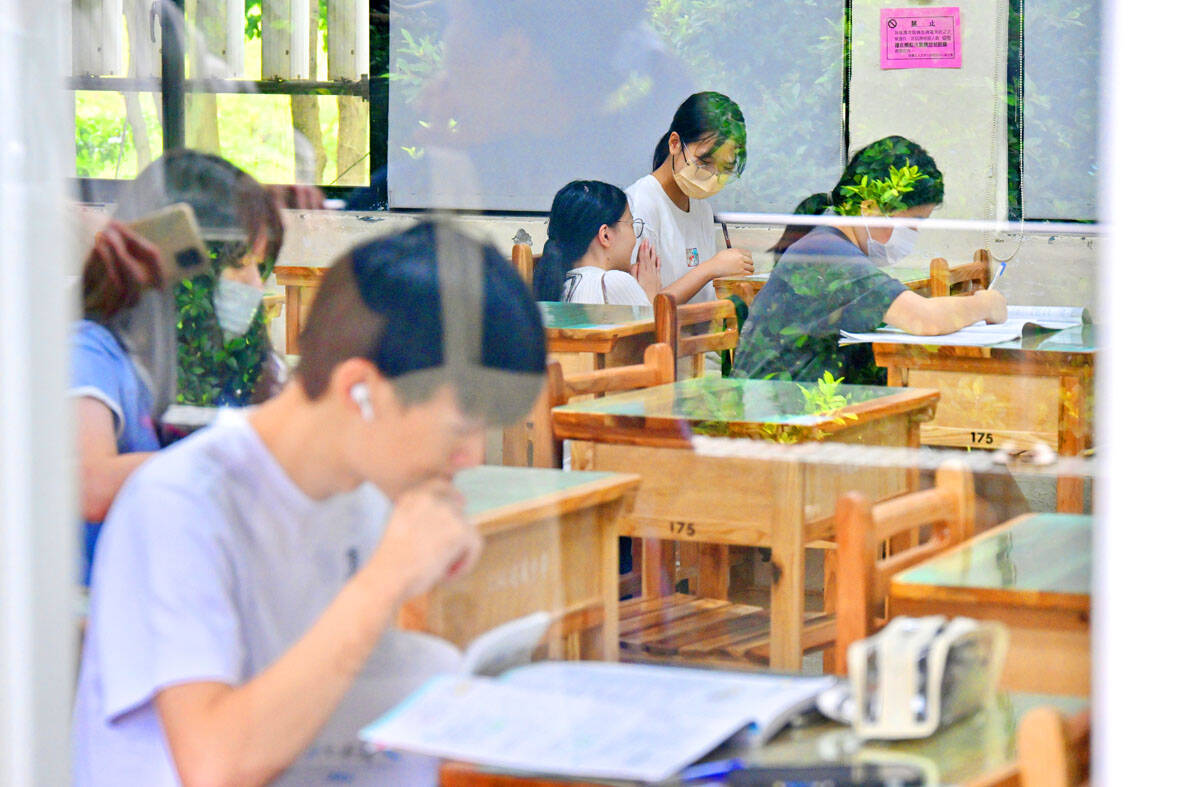Student enrollment across all age levels last year fell by 273,000 compared with five years ago, although participation in experimental education grew by 50 percent, Ministry of Education (MOE) data showed.
The decline, which accounts for 6.4 percent fewer students compared with 2019, was likely due to Taiwan’s declining birthrate, the ministry said.
However, a record-high 27,000 students were enrolled in experimental education programs last year, it added.

Photo: George Tsorng, Taipei Times
The statistics also showed that the number of private kindergartens had decreased by 62 last year, while the number of public kindergartens increased by 20, resulting in a total of 6,657 kindergartens nationwide.
Overall, there were 273 more public kindergartens last year than in 2019.
This was due to continued expansion of public early childhood education services, which resulted in 460 public kindergartens being added over the five-year period, it said.
In the same period, the number of private kindergartens dropped by 187, it added.
A total of 3.99 million students are currently enrolled across all educational levels, with elementary-school students accounting for the largest share at 1.2 million, the statistics showed.
That is followed by 1.07 million university and college students, representing 139,000 fewer university students compared with 2019, the data showed.
Of those students enrolled at the university and college level, 513,000, or 47.7 percent, are enrolled in science and technology programs, followed by 364,000, or 33.8 percent, in social sciences and 198,000, or 18.4 percent, in the humanities.
The number of students enrolled in science, technology, engineering or mathematics fields at the university and college level increased by 4.5 percent compared with 2019, the statistics showed.
This year, 140 schools were approved to offer experimental education programs, and nearly 27,000 students were enrolled in those programs — an increase of 8,911 students over 2019, the ministry said.
Experimental education is categorized into three types: school-based, public-private partnership and non-school-based education. Among these, school-based experimental education has grown the fastest, with the number of approved schools nearly doubling over the past five years, it said.
Student participation in the category rose to 12,164 last year from 7,675 in 2019 — an increase of nearly 60 percent, the ministry said.

Taiwan is projected to lose a working-age population of about 6.67 million people in two waves of retirement in the coming years, as the nation confronts accelerating demographic decline and a shortage of younger workers to take their place, the Ministry of the Interior said. Taiwan experienced its largest baby boom between 1958 and 1966, when the population grew by 3.78 million, followed by a second surge of 2.89 million between 1976 and 1982, ministry data showed. In 2023, the first of those baby boom generations — those born in the late 1950s and early 1960s — began to enter retirement, triggering

ECONOMIC BOOST: Should the more than 23 million people eligible for the NT$10,000 handouts spend them the same way as in 2023, GDP could rise 0.5 percent, an official said Universal cash handouts of NT$10,000 (US$330) are to be disbursed late next month at the earliest — including to permanent residents and foreign residents married to Taiwanese — pending legislative approval, the Ministry of Finance said yesterday. The Executive Yuan yesterday approved the Special Act for Strengthening Economic, Social and National Security Resilience in Response to International Circumstances (因應國際情勢強化經濟社會及民生國安韌性特別條例). The NT$550 billion special budget includes NT$236 billion for the cash handouts, plus an additional NT$20 billion set aside as reserve funds, expected to be used to support industries. Handouts might begin one month after the bill is promulgated and would be completed within

The National Development Council (NDC) yesterday unveiled details of new regulations that ease restrictions on foreigners working or living in Taiwan, as part of a bid to attract skilled workers from abroad. The regulations, which could go into effect in the first quarter of next year, stem from amendments to the Act for the Recruitment and Employment of Foreign Professionals (外國專業人才延攬及僱用法) passed by lawmakers on Aug. 29. Students categorized as “overseas compatriots” would be allowed to stay and work in Taiwan in the two years after their graduation without obtaining additional permits, doing away with the evaluation process that is currently required,

IMPORTANT BACKER: China seeks to expel US influence from the Indo-Pacific region and supplant Washington as the global leader, MAC Minister Chiu Chui-cheng said China is preparing for war to seize Taiwan, Mainland Affairs Council (MAC) Minister Chiu Chui-cheng (邱垂正) said in Washington on Friday, warning that Taiwan’s fall would trigger a regional “domino effect” endangering US security. In a speech titled “Maintaining the Peaceful and Stable Status Quo Across the Taiwan Strait is in Line with the Shared Interests of Taiwan and the United States,” Chiu said Taiwan’s strategic importance is “closely tied” to US interests. Geopolitically, Taiwan sits in a “core position” in the first island chain — an arc stretching from Japan, through Taiwan and the Philippines, to Borneo, which is shared by